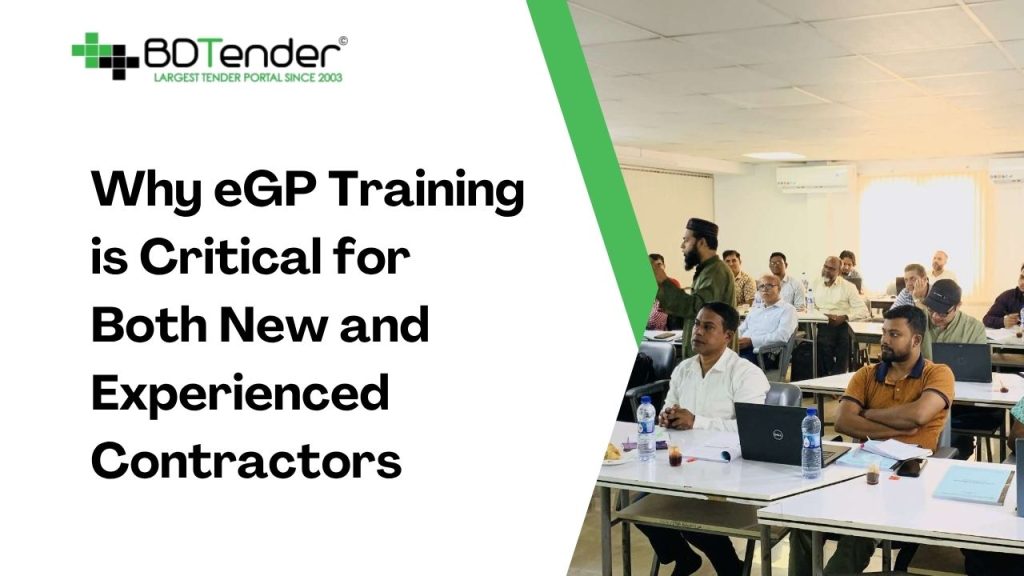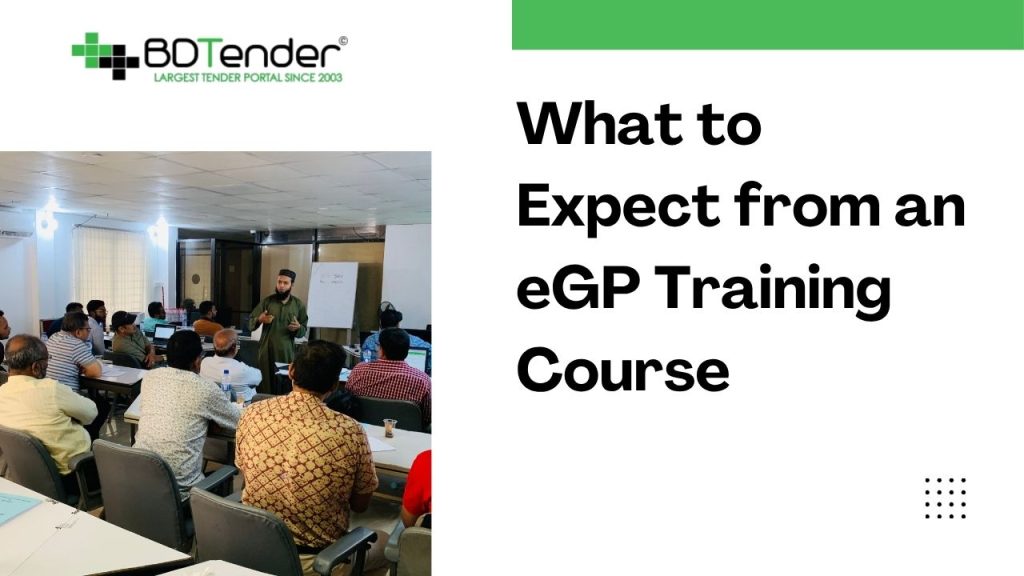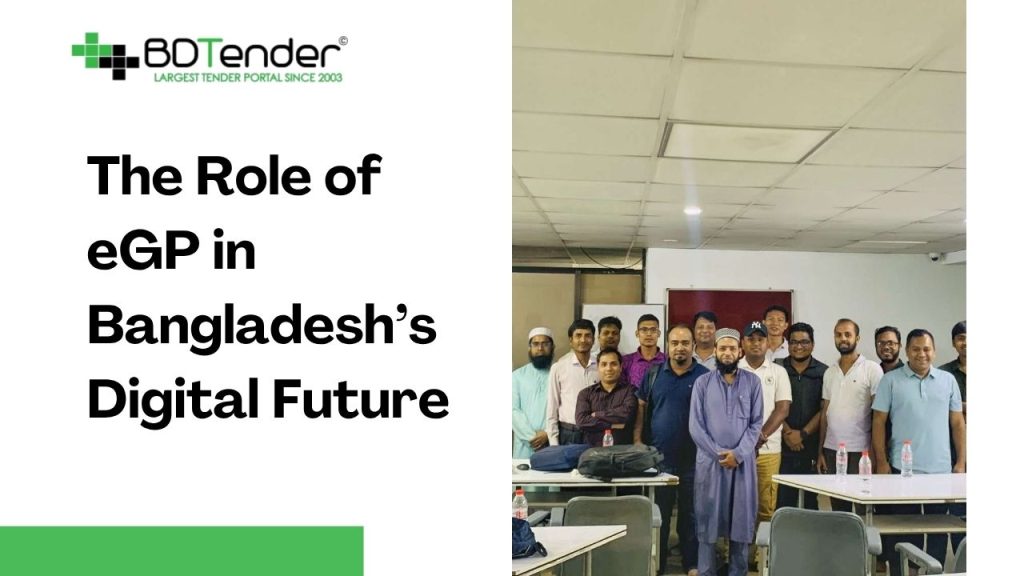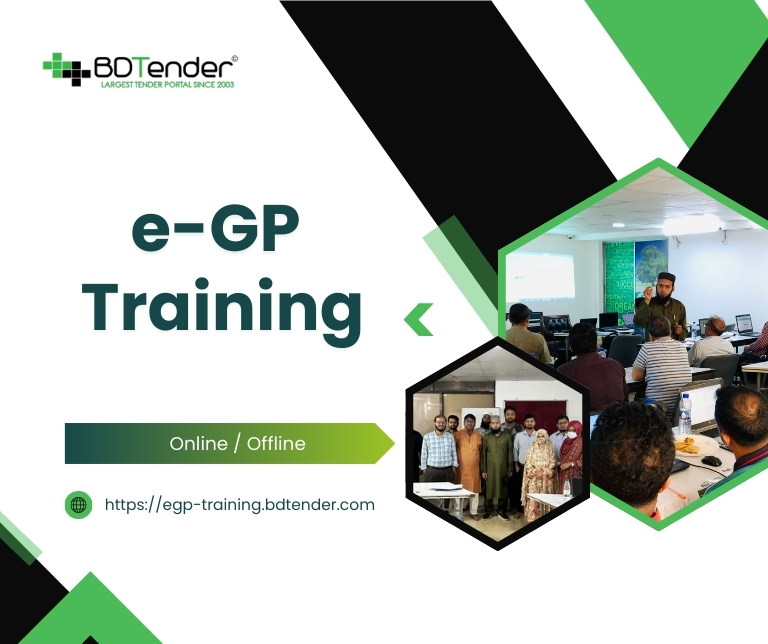Why eGP Training Matters Now More Than Ever
eGP Training is no longer optional, it’s critical. Picture this: you’re a contractor in Bangladesh who’s handled successful local projects and maybe even dabbled in government work. But now, the landscape is shifting. Everything is moving online. Tender notices are digital. Paper submissions are being phased out. Your peers keep talking about eGP, and some offices won’t even accept manual submissions anymore.
That’s exactly why eGP Training is your competitive advantage. It helps you navigate this transition with confidence, teaching you how to register on the portal, prepare compliant bids, and avoid costly errors. As Bangladesh pushes further into digital procurement, the right training gives you not just access but the skills to win.
Think about this situation. You are a contractor in Bangladesh who has done well with projects in your area. You may have even done some modest work for the government before. But now, it seems like everything is going online. You keep hearing about eGP from your friends, all of the tender notices are digital, and some government offices won’t even take paper submissions anymore.
That’s where eGP training comes in.
Bangladesh’s move toward digital procurement is more than just a trend. It changes everything about how contracts in the public sector are handled. The Electronic Government Procurement system, or eGP for short, is now the main place where all government bids are posted, handled, and rewarded. This online platform handles everything from building roads in Barisal to providing IT support for a government in Dhaka. This move makes things more open and efficient, but it also means that people have to learn how to use it. You might have felt a little lost if you ever entered into the eGP portal in Bangladesh. If you’re new to the system, it can be hard to understand how to make an account, submit official documents, use protected digital tokens, and meet submission deadlines. That’s why everybody who wants to compete in public procurement needs to have the right eGP training. An organized training course can help you understand how to make an eGP account or be ready to submit your first eGP tender. Even contractors who have been doing this for a long time are taking advanced training to stay up to date on changes and needs for compliance. As more tenders go to this digital format, knowing how eGP works has gone from being a nice-to-have to virtually a must-have. This blog will talk about what eGP is, why it is so important, where to acquire it, and how it can help you gain bigger jobs.
What is eGP? Understanding the Electronic Government Procurement System in Bangladesh
Before we talk about training, let’s take a minute to understand what eGP is.
In the past, applying for government contracts entailed printing out papers, going from office to office, and often standing in huge lines. It was easy to mess up because the rules weren’t always apparent. Tendering used to be a slow and sometimes annoying process because of this archaic system. The government has now made the process more modern with eGP. The Central Procurement Technical Unit, which is part of the Ministry of Planning, made it a fully digital platform. The goal is to make buying things more open, quicker, and easier for certified contractors all throughout the country. You can register as a supplier or contractor, look at live tender notices, obtain bid materials, submit proposals, and keep track of the results of tender openings using the eGP platform. From signing up to getting the contract, everything is done online.
Here’s a quick peek at what you can accomplish with the eGP portal:
- As a supplier or bidder, create a new eGP account
- Get the most up-to-date eGP tender BD listings
- Use the eGP user handbook for support
- Sign and encrypt your bids digitally
- Keep an eye on the status of your bids once you send them
The platform should make buying things easier, but in actuality, it has its own problems. If you upload the wrong kind of file, leave out a required field, or don’t sign your offer with the right token, your tender could be turned down without being looked at. This is why eGP training is useful. Even if you know how to use digital tools, there are restrictions and protocols that you need to follow when buying things for the government. A training session will help you follow these guidelines appropriately and make you feel more confident about managing tender applications. It’s also important to remember that eGP isn’t a set system. It gets new features, rules, and compliance criteria on a regular basis. For instance, new rules are being put in place under PPA 2025, and the criteria for evaluating tenders are being changed. Contractors who learn how to use new software remain ahead of these developments and don’t lose bids because they still use old approaches. More than seventy percent of government tenders are now handled using eGP. It’s not enough to just know how to use the platform anymore. It’s a normal component of doing business in the public sector.
Getting Started with the eGP Portal: A Closer Look at the Registration Process
The eGP portal may look like a normal government website, but it is really where you may find thousands of public contracts. You have to register before you can bid on any bids. And for a lot of new users, this is the first thing they have to deal with.
Let’s go over the steps in a basic approach.
You begin by navigating to the eGP portal and clicking on “Create Account.” There, you put in your company’s name, contact information, and the username you want to use. This is now your eGP user ID. After that, you need to upload vital papers such your TIN, VAT certificate, trading license, and national ID. The next step is to pay. You can only pay the registration fee through a bank or an approved online payment method. Your application will be sent to the CPTU for verification after the payment is completed. You will get a text or email letting you know that everything is fine and that all of your papers are in order. That’s when your account is officially active and you can start using the system to look at tenders. It looks easy on paper, but users often run into challenges they didn’t see coming. There might be a missing document. It could be that it was uploaded in the wrong way. Or maybe you forget to check your email and don’t finish the last step. These kinds of blunders might slow down the whole procedure. This is when training programs come in handy. Many eGP training institutions have in-depth lessons that are only available when you sign up. You may learn how to set up a supplier account, fill out the forms correctly, fix typical problems, and finish your profile. Some even let you practice signing up with a guide so you know what to anticipate when you do it for real. You can’t go on unless you finish this first step. In Bangladesh, registration is the first step in the whole digital tender procedure. You may get it done faster, with fewer mistakes, and feel good about starting your bidding journey with help from a training center.

People often forget about training. Some contractors think they can sort things out without help. But in real life, a lot of people lose out on big contracts because they made little mistakes during the bidding process. eGP training can help you get ahead of the competition, whether you’re just starting out or have been doing it for years.
Here are a few reasons why getting the right training is so important:
- It teaches you how to identify suitable tenders in your field and set up alerts so you don’t miss any deadlines.
- It helps you with the technical parts of submitting a tender, like how to format files and use digital encryption technologies effectively.
- You stay up to know on changes to policies, like the Public Procurement Act 2025 and any new e-token integration.
- You learn about the rules and morals of public procurement and how to write proposals that follow all the rules.
- It makes you more efficient overall, which saves you time during the busy tendering season.
A lot of contractors don’t know that even a small mistake, like forgetting to attach a certificate or using the wrong kind of file, might make their offer invalid. It’s not about not having enough experience; it’s about knowing how the system works. There are now certification classes at a number of eGP training locations. Not only will you learn more by finishing one of them, but it will also make your profile more credible when you work with government offices. If you’re new to the system, seek for training programs for beginners that will show you the ropes. You might choose to take advanced seminars or refresher courses if you already use eGP but want to get better results. You lower your chances of making a mistake, stay compliant, and give yourself the best opportunity of winning tenders by getting the right training.
From Setup to Submission: Navigating the Tendering Process
After you set up your account, the real job starts. You can now submit a bid, but how do you get from logging in to a finished bid?
Let’s make the process easier to understand by breaking it down into steps.
First, go to the eGP login page and type in your user ID and password. Use your dashboard to find active tenders that are a good fit for your company’s services. You can narrow down your search by location, department, or industry on the platform. After you select a good tender, download the bid materials and read all of the guidelines very carefully. You usually have to follow certain formatting and technical rules when you fill out these forms. Read the instructions and then fill out the forms that are needed. Most of the time, you’ll need to send in technical suggestions, financial offers, and confirmation of your qualifications. After that, use a certified USB token to digitally sign and encrypt your files before sending them to the system. Check everything again before you hit the submit button. Check that all of your documents are in the right format, that you have connected all of the necessary files, and that you submit everything on time. You can check the status of your bid via the portal once you submit it. You can also see how your bid did by looking at the results of tender openings in the system.
At first, this may seem hard, but most eGP training programs have practice sessions where you may go through the whole thing. This helps you avoid making mistakes that many people make and gives you confidence before you make your first genuine bid.

Setting up an account and submitting a tender are not the only things that an effective eGP training program should cover. It wants to let you feel completely at ease with every part of the procurement platform.
These are some of the things that are usually talked about:
- How the eGP system works and how different government agencies use it
- A full guide to making and managing your user profile
- How to search for tenders with filters and set up custom alerts
- How to get your documents ready for submission, including signing and encrypting them
- An overview of public procurement rules and how they apply to each tender
- Case studies showing what successful bids look like and where others went wrong
Some classes also teach you more advanced abilities, such how to look at past bids or make your financial proposal look better. Many training centers provide out printed manuals, digital toolkits, and even access to the eGP help line for help after the training. Depending on your schedule and comfort level, you can pick between full-day classes, weekly workshops, or online courses. If you are signing up with more than one agency, a certificate from one of these programs can also be helpful.
Where to Get Good eGP Training in Bangladesh
As more contractors get into the digital bidding arena, there are more eGP training centers. No matter where you are in Dhaka, Chittagong, or elsewhere, you can find schools that provide programs for people with varying degrees of experience.
Some well-known centers are:
- The National Institute of Local Government, which helps local contractors learn how to bid on public contracts;
- The BASIS Institute of Technology and Management, which offers hands-on training in software;
- Private training academies that offer weekend classes, demo modules, and one-on-one help with registering for tenders and bidding;
These centers offer instruction in person and online. A lot of them also publish their timetables ahead of time and give out certificates when the work is done. If you like to learn from home, there are a number of platforms that provide structured courses that you may take from anywhere in Bangladesh.

Bangladesh is making great strides in digital governance, and eGP is a big part of it. The platform is continually changing, and new features and integrations are in the works.
Some trends that will be coming up are:
- Using data analytics to make better buying choices
- Interfaces that work well on mobile devices so users may access them on the move
- More training programs that include the most recent legislative and technological changes
- Better help desk service for users all throughout the nation
- More and more suppliers need to become certified
For companies, this means you will need to remain up to speed by taking refresher courses, joining online groups, and reading news from CPTU. Users that spend in training and remain up to date will discover the greatest chances as the system becomes better. Now is the moment to take eGP training seriously whether you want to get more government contracts, do better on them, or just learn more about how the system works.
Are you ready to start?
If you need assistance picking a training course or want to learn how to enhance your bidding strategy, get in touch with a licensed eGP training center in Bangladesh or look into one of the reputable online programs. If you get ready the appropriate way, you may confidently use one of the country’s most essential procurement platforms.

